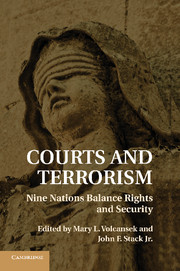Book contents
- Frontmatter
- Contents
- Contributors
- COURTS AND TERRORISM
- Introduction
- 1 Detentions and Security versus Liberty in Times of National Emergency
- 2 One More Casualty of the “War on Terror”
- 3 State Secrets and Democratic Values
- 4 What Lessons Can Be Drawn from a Sui Generis Case? The Global “War on Terror” and Northern Ireland
- 5 The British Experience with Terrorism: From the IRA to Al Qaeda
- 6 Detention and Treatment of Suspected Terrorists under the European Convention on Human Rights
- 7 Australia's Commonwealth Model and Terrorism
- 8 Judicial Rejection as Substantial Relief: The Israeli Supreme Court and the “War on Terror”
- 9 Preserving Rights and Protecting the Public: The Italian Experience
- 10 Squaring the Circle? Fighting Terror while Consolidating Democracy in Spain
- 11 From Exception to Normalcy: Law, the Judiciary, Civil Rights, and Terrorism in Colombia, 1984–2004
- Conclusion: Lessons Learned
- Cases Cited
- Statutes Cited
- References
- Index
4 - What Lessons Can Be Drawn from a Sui Generis Case? The Global “War on Terror” and Northern Ireland
Published online by Cambridge University Press: 05 July 2011
- Frontmatter
- Contents
- Contributors
- COURTS AND TERRORISM
- Introduction
- 1 Detentions and Security versus Liberty in Times of National Emergency
- 2 One More Casualty of the “War on Terror”
- 3 State Secrets and Democratic Values
- 4 What Lessons Can Be Drawn from a Sui Generis Case? The Global “War on Terror” and Northern Ireland
- 5 The British Experience with Terrorism: From the IRA to Al Qaeda
- 6 Detention and Treatment of Suspected Terrorists under the European Convention on Human Rights
- 7 Australia's Commonwealth Model and Terrorism
- 8 Judicial Rejection as Substantial Relief: The Israeli Supreme Court and the “War on Terror”
- 9 Preserving Rights and Protecting the Public: The Italian Experience
- 10 Squaring the Circle? Fighting Terror while Consolidating Democracy in Spain
- 11 From Exception to Normalcy: Law, the Judiciary, Civil Rights, and Terrorism in Colombia, 1984–2004
- Conclusion: Lessons Learned
- Cases Cited
- Statutes Cited
- References
- Index
Summary
Democratic governments have been grappling with the issue of the rule of law and terrorism long before the Northern Ireland crisis, and they continue to do so after September 11, 2001, and the more recent terrorist acts in Britain and Spain. However, Britain had to deal with a very specific form of terrorist activity in Northern Ireland, from a very specific group, the Irish Republican Army (IRA), from 1922 to 1998. To complicate matters, this confrontation was managed through the security policy of a decentralized Unionist government in Ulster from 1922 to 1972. In 1998, a major breakthrough was achieved when the Good Friday Agreement was signed establishing a consociational structure of governance for Northern Ireland, and issues that were incandescent from 1969 to 1998 then began to ameliorate. Further compromises on the issues of arms decommissioning by the IRA, police control, and prisoner release during the period from 1998 to 2007, coupled with an emphasis on Islam-based terrorist activities in Britain proper, led to a further winding down of security legislation and the use of the courts in Ulster. Thus, this chapter focuses primarily on the legislation, security activities, and the courts in Northern Ireland from 1969 to 1998.
Why the years from 1969 to 1998? A full recapitulation of the political conflict in Northern Ireland would require us to go too far back in time, to the early 1600s, and too deep into the complex relationships among land, religion, and power in Ireland in the nineteenth century.
- Type
- Chapter
- Information
- Courts and TerrorismNine Nations Balance Rights and Security, pp. 72 - 88Publisher: Cambridge University PressPrint publication year: 2010



